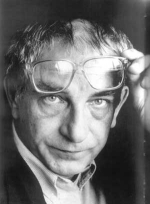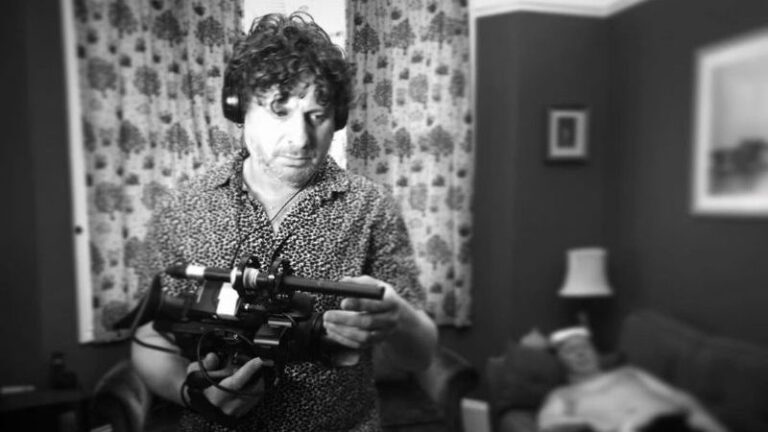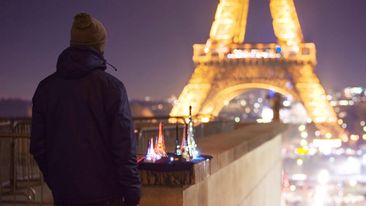GRAND HJEMMEBIO
Kim Foss meddelte for noget tid siden at biografen han leder, Grand Teatret i København ”udvider paletten og nu også tilbyder ’udbringning’ af film til din egen skærm.
På Grand Hjemmebio kan du fange nogle af de gode titler, du ikke nåede at se i biografen. Eller gense de bedste. Udbuddet er – som i biografen – nøje udvalgt efter, hvad vi synes, er det absolut bedste på filmfronten.
Vi tilbyder adgang til et filmkatalog med vokseværk. Vi vil løbende føje nye og spændende film til siden – med ambitionen om at blive dit foretrukne tilflugtssted, når du skal belønne dig selv med en filmoplevelse ud over det sædvanlige.
Der er flydt meget vand i åen siden Grand Teatret åbnede anden juledag 1913. Med over 100 års erfaring med kvalitetsfilm mener vi at ligge inde med nok viden og filmkærlighed til også at favne filmkigningen derhjemme.
Så derfor: Stort velkommen til Grand Hjemmebio! ”, slutter Kim Foss sin indbydelse.
EKSKLUSIVE TITLER
Disse dage Danmarkspremiere på nye eksklusive titler, stort bagkatalog af ældre udvalgte titler som nogle af os ikke fik ser i Grand Teatret dengang kan nu nås i Grand Hjemmebio:
https://www.grandhjemmebio.dk/
GENSYN
fælles essay af Sara Thelle, Tue Steen Müller og Allan Berg Nielsen
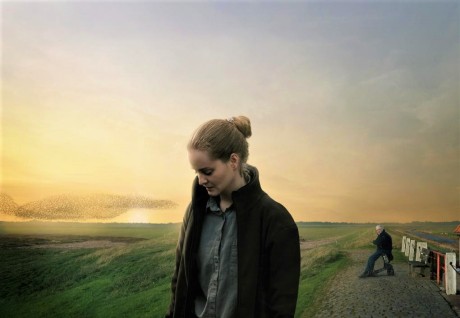
Sydjysk landskab med stående kvinde og siddende mand…
7. 11. 2019: Med ét i filmens lange dybt tilfredsstillende forløb af forunderlige scener, diskrete flytninger og tankesamlende vignetter står der uventet Onkel på lærredet! Og så kommer slutteksterne, de vigtigste først i skilte og derefter alle de andre rullende. Jeg bliver siddende i stolen. Forbløffet. Er det allerede forbi? Er hun gået? Denne vidunderlige fortælling, denne dejlige kvinde.
I instruktørens forrige film og fortælling Hundeliv (2016) havde både de to piger og den sårede soldat i filmen og jeg i biografen fæstnet os særligt ved kassedamen i supermarkedet. Hun var bare så sød, og både i sin rolle og i virkeligheden, så ægte livligt venligt snakkende med kunderne hun jo kendte. Her var det gode menneske.
Nu er hun så landmand, sød og ægte. Men nu fåmælt som onklen. Hun er forældreløs forstår jeg, han er alene og hendes nærmeste. Hun har gennem skoletiden boet hos ham på hans gård med køer og græsmarker og kornmarker, og nu som ung kvinde passer hun hans hus og driver hans landbrug sammen med ham. Begge er de tavse i dagenes arbejde og i aftenernes sagte tv-lyd fra det lille apparat oppe på skabet og aviser i stak på stolen: han. Og bøjet i den tykke krydsordsbog: hun. Han let studs, hun let indadvendt begge i en ægte jysk tavshed. Tryg og smuk. Og skildret af Frelle Petersen med kompetent indsigt…
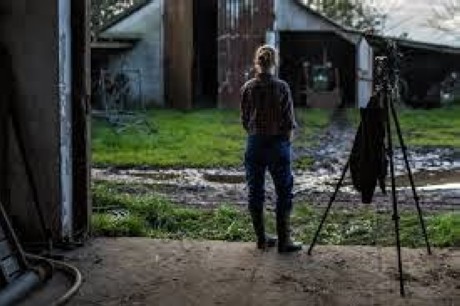
… et drama af dage og nætter, af årstidernes gang (Flaherty / Grierson)
10.11.2019: Filmen vil ikke slippe mig, jeg noterer at den tegner døgnets tid, årets tid, kredsløbets tid med dagsrytmevignetter med solnedgange som i Hundeliv. Det er helt tydeligt. Mindre tydeligt tegnet, men ikke mindre vigtig, er den lineære tid, fortællelinjen, som manuskriptet håndfast, men personinstruktionen diskret, næsten umærkeligt tegner, udviklingen hos de medvirkende, især hos den unge kvinde som lader sig kalde Kris, som klipningen selvfølgeligt sikkert fuldfører i en dramatisk kurve af overvejelser og afprøvninger filmen igennem tilbage til den ufravigelige oprindelige situation. Og Frelle Petersen lader med hende kredsløbets tid vinde over den lineære tid, alt kommer igen, intet forsvinder, det bliver ikke væk, det er stadigvvæk et vækkeur på natbordet i Kris’ værelse som sætter dagene i gang, Kris ejer endnu ikke en mobiltelefon. Til side med dynen, blå arbejdsbukser og hvid bh på, hun ruller gardinet op ser ud i den tidlige morgen. Så arbejdsdagens storternede skjorte.
Efter lang tid kommer musikken og streger ind og streger under. Det er høst og det er sensommer. Og som i alle rutiner er jeg bundet i årets stadig gentagne tid. Og i årenes, Kris har blidt overtaget onklens plads i førerhuset, hun ser hans kræfter svigte, glad kører hun videre, det er høstarbejdets tid.
Blikket over det storladne landskab i lavt aftenlys afslutter dagene, Kris’ blik forstår jeg…

Amy Berg: Janis: Little Girl Blue 2015 / Janis: Little Girl Blue (grandhjemmebio.dk)
…Just as with Scorsese’s Dylan portrait No Direction Home, Amy Berg owes some of Janis’ finest moments to D. A. Pennebaker. Not only with the strong scenes from his legendary concert film Monterey Pop (1968, filmed by Pennebaker, Leacock and Maysles, probably the most musical trio in film history), the film that sparked off Joplin’s route to stardom…
Nearly two hours in company of Janis Joplin, what’s not to like! I was so ready to just lean back and enjoy and I was… disappointed.
Whoa, slow down, hold your horses! I’m being bombarded with talking heads at a speed so I can’t follow. Too fast a pace when all I want to do is to take my time, hear the music, feel the music and the person I’m about to discover.
I’m disappointed because I’m sitting in the dark theatre all alert and ready to take in impressions, emotions, sound, images and Music and I’m not getting the cinematic experience I thought I would. And I’m annoyed because I think a big part of my disappointment is a question of the editing. I don’t mind a conventional portrait film, I don’t mind seeing a TV-documentary in a theatre, but I do mind the rushing.
All the information, all the anecdotes and the archive footage lose sense if I don’t get the time it takes to “meet” the performer and her music. If there is not a moment where I hear something I haven’t heard before, suddenly discover the lyrics of a well-known song or just get to linger on a live performance…
Having said that, award-winning American filmmaker Amy Berg (the Oscar-nominated Deliver Us from Evil, 2006, about child molestation within the Catholic Church) has made an impressively well-documented portrait of Janis Joplin. It has been a long-term project initiated by the Joplin estate who approached the director back in 2007 and behind the film lays a huge amount of work with archive research, funding and clearing rights.
Part of Berg’s take on telling the story is a voice-over (the voice of another southern singer/musician Chan Marshall, known as Cat Power) reading Janis’ letters to her family and lovers. Dear family, she wrote continuously throughout the years, giving news to the Texan middle-class nuclear family she came from (the family letters was originally used by Joplins sister Laura in her book Love, Janis from 1992, later turned into a theatre play and a Broadway show). Joplins two younger siblings (Laura and Michael Joplin who manage their sisters estate), old friends, band mates and fellow musicians are looking back. The portrait seems less depressive and dramatic than I thought it would be, and I like that. Lots of life, fun, love and friendships, the story of a strong young woman who at 17, to her own big surprise, discovers she can sing and from then on the rise to fame, but also the beginning of a heroin and alcohol addiction that ends up causing her sudden death.
Just as with Scorsese’s Dylan portrait No Direction Home, Berg owes some of Janis’ finest moments to D. A. Pennebaker. Not only with the strong scenes from his legendary concert film Monterey Pop (1968, filmed by Pennebaker, Leacock and Maysles, probably the most musical trio in film history), the film that sparked off Joplin’s route to stardom (Pennebaker is there himself to reveal how close Joplin was to not be in his movie!), but also with his footage of Joplin and the band Big Brother and the Holding Company in the recording studio and at concerts (material that Pennebaker and Hegedus have used in their short Joplin-film Comin’ Home from 1991, I now find out from the credits). The recently released Festival Express (2003) by Frank Cvitanovich and Bob Smeaton, documenting the 1970 tour by train through Canada gathering Joplin, Grateful Dead and The Band, is another invaluable source.
The press material states that no one had ever explored Janis Joplin’s story on film. A quick search and I discover that Howard Alk (The Black Panther film The Murder of Fred Hampton, 1971, and editor on Dylan’s Renaldo and Clara) made the portraitJanis: The Way She was in 1974. I have to see that! I assume that old time conflicts between the estate and Alk must be the reason that the film is not quoted even though important and mostly unique scenes from it are reused in Berg’s portrait. I have promptly ordered the Howard Alk DVD, maybe a second Janis Joplin portrait film review will be coming up soon…
I found Janis: Little Girl Blue to be out of rhythm, which is no good when we’re talking about Joplin. But please do go see for yourself, you might not agree with me…

Bridgend 2015 / Bridgend (grandhjemmebio.dk)
Vi var i biografen og så Jeppe Røndes ”Bridgend” – redaktørerne af dette site, Allan Berg og Tue Steen Müller ledsaget af sidstnævntes kone Ellen Fonnesbech-Sandberg. Hjemme i kolonihaven talte vi om filmen i timevis, læste Kim Skottes Politiken-anmeldelse og Ralf Christensens fra Information, begge meget rosende. Men noget mangler i deres vurderinger, blev vi enige om. Det kommer her fra Allan Berg:
”Jeg drukner i disse voldsomme store drenges uartikulerede støj, men jeg rammes til gengæld præcist af den unge kvindes gennemspillede bevægelse fra distant nysgerrighed over undrende analyse til beslutsom involvering. Jeg ser uundgåeligt, at den unge kvinde er i slægt med den unge kvinde i von Triers ”Breaking the Waves” og med den unge kvinde i hans ”Dancer in the Dark”, i slægt med Tarkovskijs unge kvinder i ”Solaris” og i ”Andrej Rubljov”. Disse kvinder griber alle ind i tilværelsen og trodser den samfundsbestemte skæbne ved at ofre sig selv. Filmene bliver således for mig elegier over denne kvindelige lidelse og offertemaet i Jeppe Røndes film samler sig om denne ene skuespiller, som også er den eneste, der skildres som helt menneske, som når hun låner sin elskede af sit liv og han styrket af dette forlader sin éndimensionelle rolle (i hans tilfælde som fardomineret kordreng), den afgrænsede rolle han og alle andre personer omhyggeligt er tildelt i Røndes overdådigt udstyrede og strengt stiliserede marionetspil…
Den unge kvinde bryder imidlertid ud af dette snoresystem, bryder alle regler og gennemfører suverænt sin rolle i det drama om en frihedskamp, som hedder kvinden og mændene, river sin mand ud af flokken, han er blevet udvalgt fordi han har sunget for hende, han er kunstner og således ægte og sanddru, og som Tarkovskijs nøgne kvinde fra det frie samfund i skoven forfulgt af massakrerende krigere går hun ud i vandet beslutsom, rank og sejrende som en Paionios’ Nike, jeg ser rygvendt. Hun vil hellere tage sit liv end underkaste sig og overgive sig til voldtægten. Hendes elskede og resten af den unge menighed følger hende. ’Hun er stærkere end alle os andre’, havde de sagt om hende.”
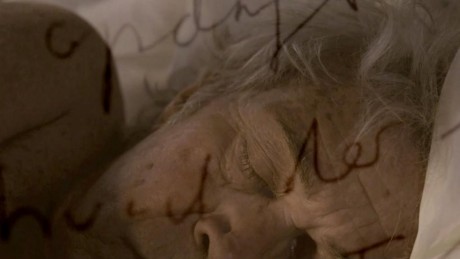
I Walk, 2019 / I Walk (grandhjemmebio.dk)
Når det gælder Jørgen Leth, 2019 er det altid, og i høj grad i denne meget store og aldeles vigtige film, umuligt at skille manden fra værket. Og jeg, som i min ungdom var opdraget i det autonome værks ånd, jeg som dog trods dette har læst biografier og selvbiografier med begejstring, men vist som underholdning, ikke som nøgler til værkerne, jeg anbringer nu tryg I Walk på hylden med verdenslitteratur, de uomgængelige film og bøger: Godards framinger (Asger Leths bemærkning et sted), Herzogs vilde bjergbestigning (synopsens association et sted), Rilkes elegier og Inger Christensens sonetter (mine private tanker undervejs i mit møde med Jørgen Leths nye storværk.
Kære Jørgen, hele tiden mens jeg ser din film og hører din ustandselige, smukke og kloge stemme tænker jeg på Rembrandts tror jeg nok sene selvportrætter, hensynsløst fortvivlede, og skridt for skridt dybere erkendende det som ikke bliver væk, dette vigtige, du skriver til sidst i din seneste bog:
Det bliver ikke væk jeg har skrevet det ned det bliver / ikke væk Jeg skriver det ned så det er der / Så står det der Det behøver ikke være en blank side / Det forsvinder hele tiden / Det skal bare puttes på plads / Det må ikke blive væk / Og det er vigtigt at huske / Tankerne er gode men de forsvinder / De skal indfanges under glas, ligesom insekter / Pilles fra hinanden ligesom insekter
Nej, Jørgen. Du har ret, det bliver ikke væk, for det ligger længere fremme og venter. Din digterkollega Lea Marie Løppenthin kommer dig nemlig til undsætning: “Det var først for nylig, at jeg undersøgte etymologien for det korte, skrappe ord ”væk”: Fra middelaldertysk wech, afledt af weg ’vej’, jævnfør norrønt á veg ’på vej, bort, væk’ beslægtet med vej.
Det lykkelige ved opdagelsen sidder stadig i mig – / Det der er væk, er altså bare nede ad vejen. / Det, der er væk, er bare et andet sted end her.”
Løft højre fod og tag med din vilje et skridt frem og løft venstre fod og tag med vilje et skridt frem. Du Går…
NOTER
JANIS
Janis: Little Girl Blue (2015, 103 min.) Production: Disarming Films and Jigsaw Productions. Danish distribution: Camera Film in collaboration with CPH:DOX Premiering in Danish theatres all over the country October 22nd. 2015. DR2 DOKUMANIA I MORGEN AFTEN tirsdag 18. oktober 20.45 og efterfølgende på DR TV. Filmkommentaren.dk review: 4/6 pens.
Trailer: https://www.youtube.com/watch?v=AYizdG42THg
BRIDGEND
Danmark 2015, 99 min.
Still: Hannah Murray som den unge kvinde
SYNOPSIS
A Bridgend Story (working title) is a film about a teenage girl, SARA, who arrives with her father to a small village in the welsh valleys of Bridgend County that is haunted by suicides amongst its young inhabitants. She falls dangerously in love with one of the youngsters while her dad as the new town policeman tries to solve the mystery. The film is based on true events. (IMDb)
Kim Skottes anmeldelse: politiken.dk/filmanmeldelser
Ralf Christensens anmeldelse: http://www.information.dk/537714




